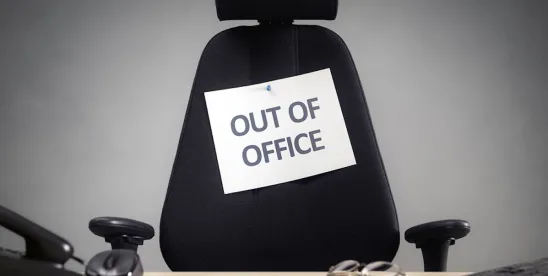Under the Cook County Paid Leave Ordinance, most employers in Cook County, Illinois, must provide their employees in the county up to 40 hours of paid leave that can be used for any reason. The Cook County Commission on Human Rights issued Final Interpretive and Procedural Rules governing the Ordinance that provide employers much-needed clarification, including on who the Ordinance applies to and whether it overlaps with other state and local leave entitlements, how to calculate paid leave under the Ordinance, whether carryover of accrued, unused paid leave may be capped, and when employers may lawfully deny paid leave requests. The Final Rules also contain other extensive requirements, and employers are encouraged to consult counsel for assistance in updating their written leave policies to comply with the Final Rules.
Who does the Cook County Paid Leave Ordinance apply to?
The Final Rules clarify that an “employee” is an individual who performs greater than 50 percent of their total compensated work while physically present within the geographic boundaries of Cook County and is not otherwise exempt from the Ordinance. Covered employees who work the majority of time in Cook County are entitled to accrue at least one hour of paid leave for every 40 hours worked, up to 40 hours per 12-month benefit period.
Does the Ordinance overlap with the Illinois Paid Leave for All Workers Act and the Chicago Paid Leave and Paid Sick and Safe Leave Ordinance? Which apply to my business?
Coverage is primarily determined by the employee’s work location. For example, with limited exception, employees who work in Cook County, but not in the City of Chicago, are subject to the Cook County Ordinance. Municipalities in Cook County that opted out of Cook County’s Earned Sick Leave Ordinance are not considered to have opted out of the Paid Leave Ordinance unless further opt-out action is taken. Even if a municipality opts out, it will still be subject to the similar statewide requirements of the recently enacted Paid Leave for All Workers Act.
The Final Rules confirm that the Commission will defer to the paid leave laws of any municipality within Cook County that has enacted a paid leave law with requirements equal to or greater than that of Cook County, including the City of Chicago’s Paid Leave and Paid Sick and Safe Leave Ordinance. As a result, employers of Chicago-located workers will not need to comply with both the Cook County Paid Leave Ordinance and the Chicago Paid Leave and Paid Sick and Safe Leave Ordinance.
Can employers frontload Cook County paid leave?
Yes. An employer may choose to frontload paid leave at the beginning of a 12-month benefit period rather than use the accrual method, so long as the number of hours of paid leave the employee receives is not less than what the employee would be entitled to had they accrued the paid leave and the employer provides written notice of frontloading. If an employee works more hours than anticipated (for example, an employee is hired to work 20 hours a week but ends up working 30 hours a week), an employer may use a combination of frontloading and accrual methodologies to “true up” the employee’s entitled paid leave hours.
Does Cook County paid leave carry over?
Yes, when the employer provides leave under the accrual method. The Final Rules confirm that employers using the accrual method must allow employees to carry over up to 40 hours of unused paid leave from one 12-month period to the next 12-month period. However, employers using the frontloading method are not required to carry over paid leave from one 12-month period to the next and may require employees to use all paid leave before the end of the benefit period or forfeit the unused paid leave.
Does an employer have to choose accrual or frontloading?
No. The Final Rules state that an employer may provide some employees frontloaded paid leave and others accrued paid leave, so long as the employer’s written policy satisfies the minimum requirements of the Ordinance.
Can employers require notice to use paid leave?
Yes. With a reasonable written policy in place, employers may require minimal notice. For example, if use of paid leave under the Ordinance is foreseeable, the employer may require the employee to provide seven calendar days’ notice before the date the leave is to begin. The Commission will consider a policy requiring advance notice of foreseeable paid leave use to be unreasonable where such a policy: (1) is not in writing; (2) has not been communicated to the employee before the employee’s failure to provide notice; (3) would require the employee to give notice when the employee is unconscious or otherwise incapacitated; (4) requires an employee to provide notice more than seven days before the absence; or (5) limits how an employee can provide the required notice such that compliance is so unreasonably difficult that paid leave cannot, as a practical matter, be used.
An employer may also establish a reasonable written policy requiring notification for unforeseeable absences as soon as practicable. The Commission will consider a policy regarding required notification for unforeseeable paid leave use to be unreasonable where the policy: (1) is not in writing; (2) requires notice when the employee is unconscious or otherwise incapacitated; (3) disallows a third-person other than the employee to provide the required notice on behalf of the employee; (4) requires an employee to provide notice before the day of the absence; or (5) excludes notification by phone, email, or text messaging.
Can an employer deny a request to use Cook County paid leave?
Yes, but circumstances for denial are limited and must be explained in an employer’s written policy. An employer may deny an employee’s request to use paid leave under the Ordinance only if such denial is necessary to meet the employer’s core operational needs for the requested time period. To evaluate whether the employer was justified in its denial of paid leave under the Ordinance due to operational needs, the Commission will consider whether (a) the employer provides a need or service critical to the health, safety, or welfare of the people of Cook County, (b) similarly situated employees are treated the same for the purposes of reviewing, approving, and denying paid leave under the Ordinance, and (c) granting leave during a particular time period would significantly impact the business operations due to the employer’s size.
What if my business uses temporary staffing workers? Which company must comply with the Ordinance?
Under the Final Rules, if a temporary staffing firm and user organization or entity control the employee’s work or working conditions, the staffing firm and user entity are said to be “joint employers.” All joint employers of an employee are responsible both individually and jointly for compliance with the Ordinance but only the staffing firm is required to maintain records of staffing firm workers’ paid leave accrual and use.
Is an employer required to pay out Cook County paid leave upon separation?
It depends. If an employer credits paid leave to an employee’s vacation or paid time off (PTO) bank, then it must pay the employee for any unused vacation or PTO upon the employee’s termination, resignation, retirement, or other separation consistent with the Illinois Wage Payment and Collection Act. But, if an employer does not credit Cook County Paid Leave to an employee’s vacation or PTO bank, and treats it separate, then it need not be paid out upon separation.
At what rate should Cook County paid leave be paid?
Leave required to be paid under the Ordinance is paid at the employee’s regular rate of pay, which is a term of art referring to the average hourly rate calculated by dividing the total pay for employment (except the statutory exclusions) in any workweek by the total number of hours actually worked. For employees who customarily receive gratuities, the rate must be at least the full Cook County minimum wage for non-tipped workers.







 />i
/>i

